Cover Story
Returning to Roots
I was attending a seminar at East West University in November 2010. The business club of the university arranged the seminar highlighting the issues of marketing farmers' produce in a meaningful way. At the end of the event, I made them an offer. I asked them whether they wanted to really connect with farmers and live in their shoes for a few days. I asked them whether they would like to go to the farmers' field, work like farmers and earn their living, just like the farm labour does. Many of them raised hands and for the first time ever, in January 2011 (Boro season) I took four students of EWU to the field as Hridoye Mati O Manush started its new programme called Firey Chol Matir Taney or Returning to Roots.
...............................................................................................................
Shykh Seraj
That's how 'Returning to Roots' started its journey. Already Returning to Roots is in its second season. Meanwhile, during the Aman season, four students, two students each from North South University and BRAC University went to field with me. Into the second season, students from Asian University and South East University also had participated in the Boro activities. Meanwhile, the initiative was also spread out among the school kids, kids who are in the fifth-grade. First the students of Seabreeze and then the students of Scholastica finished their task of sowing and harvesting potato, which was relatively easier for the kids. Today, I'll tell you about the very recently ended potato harvesting camp with the Scholastica kids and also a bit more about Returning to Roots, which I see as a community leadership initiative.
Agriculture is the main stay of our economy but it has remained beyond the urban mindspace. Farmers sacrifice their life to feed 160 million people, but till date, city-dwellers could barely feel farmers' struggles and miseries during agro-production processes, let alone the new generation. They don't have any idea on diverse aspects of agricultural production and commerce. This is a big conceptual gap in an agrarian country where we live.

To bridge this gap, this initiative was thought of to give an overall idea on agriculture to the future country-leaders… the new generation. Through this programme, they'll realize a farmer's deprivation, sacrifice, what they get and what not, wage discrimination and about farmers' daily reality. This is such a practical learning through which, their conception, psyche and agricultural evaluation will transform radically.
At field level, this initiative turns into a full-fledged competition. This programme continues in different crop-seasons, starting from Boro and ending in Aman each year. After the participation, students submit research papers on their experiences, highlighting what can be done for farmers in a meaningful way. In return, the students receive honourary certificate of 'Hridoye Mati O Manush Fellowship'. The fellowship is in recognition of their efforts, and is both an educational and professional achievement.
On 29th of November, 2011, Hridoye Mati O Manush invited fifth-grade students Scholastica, one of the largest English medium schools of the country, to the field for first-hand agricultural knowledge. At the break of dawn, I took twenty students to the field, situated in Kewar village, Munsiganj Sadar for planting potato seeds. After learning about the primary demonstrations from farmers, they planted on around 10 katha land of Kamruzzaman, a friendly farm-owner.
During the last potato season, fifth-grade students from Seabreeze International School also took part where they harvested potato. This year, 20 students from Scholastica were selected to plant potato seeds during the Robi season, when potato is grown. Before going to the field, selected students came to Channel i to take part in a brief workshop session on plantation of potato.
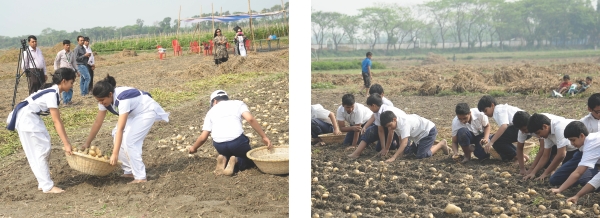
They were taken back three months later to the same field, so that they could harvest what they themselves had sown. Twenty curious pairs of eyes accompanied me. At this age, everything brings smile to their faces. On their way, I was noticing their overflowing emotions as if they were actually going to their own farmland. It was one and a half hour journey to reach Munsiganj's Kewar. This is the village they saw and became a part of three months earlier. This is their second visit to Kewar. They had to cross a bamboo bridge to get to the field. The land where they worked is quite far. The soil was wet. The first rainfall of Chaitra (Bengali month) made the land softer. And the sun came late.
The potato field of Kamruzzaman is situated in Kewar's Satanikhil village. This is, in a sense, the potato field of these twenty kids. The kids don't know much about farming but the seed of it was sown the day when they first sowed potato here. Now, they've become farmers. They sowed in playful mind, but now they're overwhelmed to see what they have done. There's no time to think. Straws were on the field. Moving the straws was their first task as Kamruzzaman ordered, “Hurry up, it's getting late”.
“It's really tough to move the straws cause they are heavy”, said a student. I was waiting for such statements. I knew that their eager minds are gathering a precious experience, a precious life-skill. These kids would be able to feel the real needs of farmers and will be able to put their thought and effort towards the development of farmers and the socio-economic development of Bangladesh. It's a far-sighted vision, but not a dream out of the realm of possibility. I am sure we will see the reflection of this in the future.
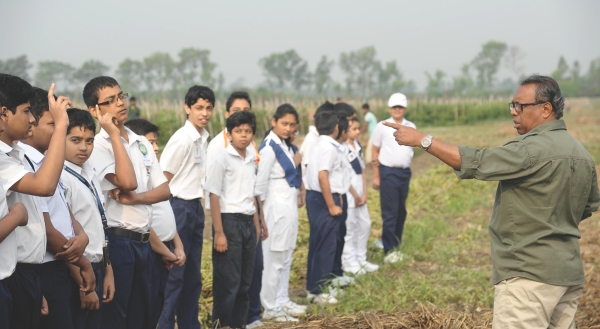
Returning to Roots is by no means just a television show; it's a real life experience where young students and kids become part of one of the most important sides of Bangladesh. And, it's the students who tell me, “I will prepare a new marketing strategy for farmers' produce”, “Why can't we brand a district with its special crop?”, “I'll invent a new technology for rice harvest”, “I'll make a cost-effective irrigation facility for farmers”, “I'll write on my blog so that farmers can get fair price”. Many a times, the audience may get confused that I'm trying to turn these students into farmers. That's not the objective. What I am trying to do is to sow the seed of conscience into the hearts of these urban beings. I have also been repeatedly asked a question that why I only take the urban students to the fields. The answer is quite simple - students who are from rural parts of the country, they are already aware about farming.
Wet straws became weighty due to overnight shower. If those were dry, it would've been easier to carry. But that wasn't possible. Local farmers helped the kids to move the straws. “Watch out…over there…Oh my God!” screamed out a kid. I rushed there and found a little rat came out from underneath the straws, which was a big scare for some!
Finally straws were cleared from the field. Now they needed to draw lines…yes it was time to plough the land. They were struggling to draw the line it was nothing for a rural kid who did one line quite fast. They left back their shoes and socks to feel the soil.
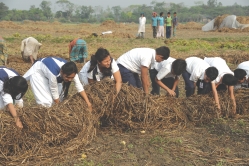 Potato harvest started. Forty hands became real busy. How these potatoes have grown seemed no less than a miracle for the students. Potato harvest started. Forty hands became real busy. How these potatoes have grown seemed no less than a miracle for the students.
“I can't believe my own eyes! I produced it.”
“I'm so happy.”
“This is a dream come true for me.”
“I'll never ever forget this moment.”
Such were the expressions of happiness from the students.
It's hard work, but the reward is so much greater - the feeling of being able to actually produce something out of the soil. Children of farmers naturally harvest potatoes. But, it was a rare scene as the students from English medium schools were harvesting them. Local inhabitants became very curious and they rushed to the field to see how these urbanites were working.
Additional DC and SAAO of Munsiganj came to the field to see the students. Farmers conveyed to the officers about their hardships. Many emotions were shared. The officers were so impressed and praised the kids for what they were doing. After a while, the students had the 'used to' look in harvesting potato. They were working like professional farmers. The heap was getting bigger and bigger…it was looking like a little mountain of potatoes. Finally the harvest work was completed. Twenty students also bought 10 kgs of potato each from Kamruzzaman to carry back home with them.
Farmers produce food, but they don't have enough food to eat. How long will this suffering continue? Bangladesh cannot develop as an economy without improving the lives of farmers – roughly 60 percent of the country's labour force. Farmers still do not get just prices of their produce. The middlemen eat up the cream. It's indeed nice to know that other channels have picked up this issue and are doing similar programmes. This will really help generate awareness among the policymakers and urban dwellers.
The students of different universities will be sent to different areas in peak crop cultivation or harvesting periods every year. And, the kids will be sent to farmlands to complete comparatively easy farming tasks. After returning to Dhaka, they will prepare a report suggesting ways to improve farmers' lives. This practical experience of Scholastica fifth-grade students will definitely inspire other kids across the nation. And these students will recall the soil, farmers and the green lands of Bengal. Four decades from the birth of the nation, we expect a future generation who best knows their soil, their motherland. Patriotism is not merely an emotion, is it the willingness to change the country for the better. It is a state of being that is best evoked by the love of the soil of motherland.
Cover Illustraion by Ujjal Ghose
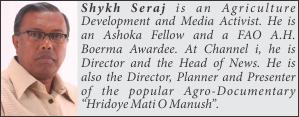
Copyright
(R) thedailystar.net 2012 |

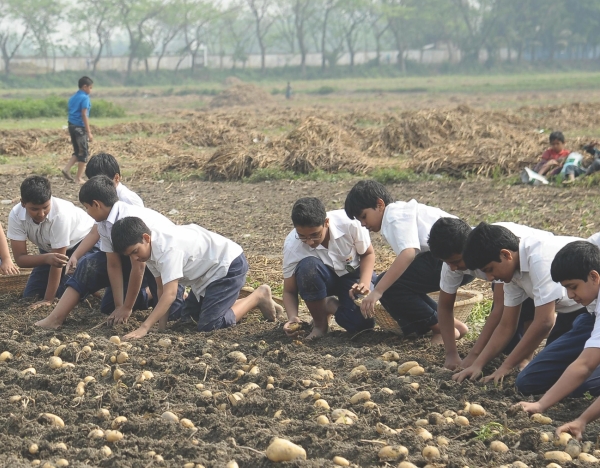



 Potato harvest started. Forty hands became real busy. How these potatoes have grown seemed no less than a miracle for the students.
Potato harvest started. Forty hands became real busy. How these potatoes have grown seemed no less than a miracle for the students. 